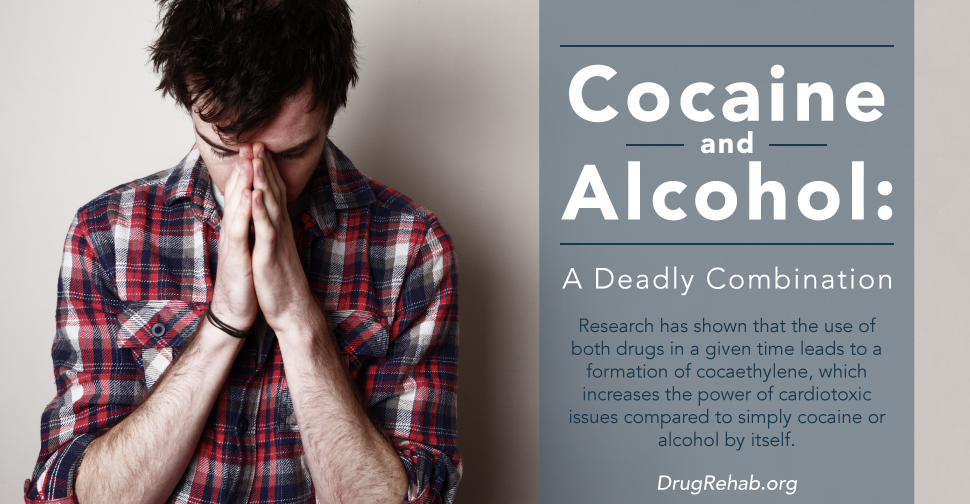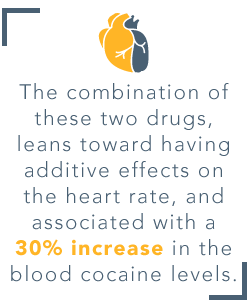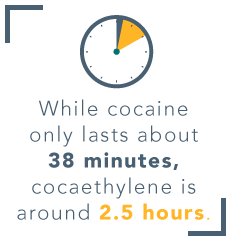
Some people drink to engage socially, to celebrate, or to simply relax from a stressful day. However, for some, the power of alcohol is highly misunderstood, and many find it tough to balance it in a healthy perspective. In fact, some even make the dangerous choice of combining it with other drugs, further compounding the dangers of each. Whenever you combine two or more drugs, the danger increases—cocaine and alcohol are no different. First, let’s take a look at these two drugs individually, in order to better understand their potentially deadly risks when combined.
Hazards Of Cocaine Use
Cocaine is a stimulant drug with very powerful properties. It works within a person’s brain by increasing levels of an important neurotransmitter called dopamine. It is the overabundance of this chemical that is responsible for causing the “high” attributed to cocaine use. Like any stimulant, it causes a variety of short-term disturbances, and more long-lasting, and dangerous risks.

In the short-term, cocaine causes:
- An increased sense of happiness, energy, or alertness
- Hypersensitivity
- Constriction of blood vessels
- Enlarged (dilated) pupils
- Nausea
- An increased body temperature
- Cardiac changes, including an increased heartbeat and blood pressure
- Tremors and involuntary muscle twitches
- Irritability or restlessness
- Paranoia
Depending on the usage, particularly, the means of administration, frequency, and quantity of use, the risks may change, however, here are some of the most common long-term results and dangers:
- Individuals that snort cocaine may encounter nasal disturbances, including a runny nose, nosebleeds, or a loss of sense of smell, and they may also experience difficulty swallowing.
- A person that consumes their cocaine orally will experience a reduced blood flow that increases the odds of acute bowel decay.
- Injection drug users face an increased risk of contracting HIV, hepatitis C, or other infectious diseases.
- Even people who don’t inject, experience a greater risk of contracting HIV. This is because cocaine impedes judgement, increasing the odds that a person will engage in an unsafe sexual practice.
- Malnourishment
- Parkinson’s disease
- Severe paranoia, often accompanied by auditory hallucinations
Cocaine can also cause a fatal overdose. It is important to realize, that this can happen on the first time a person uses cocaine, or at any point thereafter.
Dangers And Risks Of Alcohol Abuse
Alcohol is a central nervous system depressant that is found in a variety of beverages, including, beer, wine, and mixed drinks. Alcohol is processed by your liver, however, this organ can only process a certain amount in a set time, hence, when a person consumes an excess, the remainder that cannot be processed remains in your body’s system, causing the variety of side effects that we attribute to an increased alcohol consumption. Alcohol abuse can be very damaging, and impacts every organ within a person’s body. The following are risks linked to alcohol abuse and addiction, most of which are sourced from the National Institute on Alcohol Abuse and Alcoholism:
- Disruption of the brain’s communication pathways. Alcohol alters a person’s mood, judgement, behavior, and sense of inhibition, making it difficult to think in a clear manner.
- Impaired coordination
- Drinking too much over a period of time, or even during a single event, can lead to various cardiovascular concerns. In the long-term, heavy drinking can cause alcoholic cardiomyopathy, which is the stretching and drooping of the heart muscle. Both binge and long-term drinking patterns can cause arrhythmias (an irregular heartbeat), stroke, or high blood pressure (hypertension).
- Heavy drinking exerts a massive toll on the liver, this damage can include: hepatic steatosis (fatty liver), alcoholic hepatitis, fibrosis, cirrhosis, or hepatic encephalopathy.
- Production of toxic substances in the pancreas that can lead to pancreatitis, a dangerous inflammation and swelling of blood vessels in the pancreas that inhibits proper digestion.
- Increased risk of cancer
- Weakened immune system creates a much easier target for disease.
- Digestive concerns, which may create a state of malnourishment
- Seizures associated with withdrawal
The Risks Of Combining These Two Drugs
The urge to combine alcohol with cocaine is highly popular among some who use these drugs, especially within certain social settings. The increased “high” that results from the combination of these two drugs, back-to-back, creates a bridge for the feelings of each to continue at now heightened levels. Some choose to use alcohol when using cocaine, in an attempt to circumvent the uncomfortable feelings associated with coming down off the drug.
On its own, cocaine offers a user less than an hour of euphoric feelings—typically the high only lasts 5-30 minutes, depending on how it’s administered, with all effects dissipating within an hour. Pairing it with alcohol gives some people the boost they are looking for. For some, this makes it a much higher temptation then simply using one drug or the other, a combination that increases the risk of overdose, and ushers in a host of other dangers, including increased cardiovascular concerns.
Looking back to the individual side effects and risks, you’ll notice some commonalities. Both drugs have the potential to increase your blood pressure. Thus, taken in combination, the risk attributed to hypertension may increase even more, the most notable risk of this being stroke, which in some cases may lead to death.
Both alcohol and cocaine can cause malnourishment, which may set the stage for other hazardous complications, including an increased risk of infection and infectious disease. As we’ve noted, both drugs decrease a person’s judgement. Due to this, a person may experience an even greater risk of contracting an infectious disease, several of which may be deadly if left untreated. This risk may be higher if their immune system is already compromised from these forms of substance abuse.
ScienceDaily reported on a 2000 study, published in the journal Neurology, which sought to examine if there was increased cognitive impairment when cocaine and alcohol were combined. ScienceDaily reported that the study found this combination “leads to more impulsive decision-making and to poorer performance on tests of learning and memory than does use of either cocaine or alcohol alone.” They also noted that these effects were present for a month after the substance abuse stopped. Poor and impulsive decision-making skills may lead a person to riskier behaviors, such as driving a car while using drugs, which may jeopardize their life.
reported on a 2000 study, published in the journal Neurology, which sought to examine if there was increased cognitive impairment when cocaine and alcohol were combined. ScienceDaily reported that the study found this combination “leads to more impulsive decision-making and to poorer performance on tests of learning and memory than does use of either cocaine or alcohol alone.” They also noted that these effects were present for a month after the substance abuse stopped. Poor and impulsive decision-making skills may lead a person to riskier behaviors, such as driving a car while using drugs, which may jeopardize their life.
As another study notes, the combination of these two drugs is not without danger, resulting in “greater-than-additive effects on heart rate,” in a capacity that is equivalent to an increase of cocaine blood levels by 30%. For a person that has an existing heart condition, this could be a fatal complication. This publication goes on to note that these drugs, when combined, may increase a person’s propensity towards violent thoughts and behaviors—which could put a person in a position where their life is endangered, such as if they start a fight, or consider self-harm. Lastly, it cites research that illustrates that the use of both drugs in a given time leads to a formation of a toxic chemical called cocaethylene.
Facts About Cocaethylene
Cocaethylene is formed in the body without most users even realizing it or the risks it creates. The production of the chemical cocaethylene may be responsible for many of the severe risks attributed to the combination of alcohol and cocaine. The presence of this chemical increases the severity of cardiotoxic issues, complications caused by the chemical burden on a person’s heart, in comparison to the effects of cocaine or alcohol alone.
 Cocaethylene creates a greater state of euphoria. It works similar to cocaine, creating even more intense feelings of pleasure, due to its increased ability as a reuptake inhibitor of dopamine. In addition, cocaine only has a half-life of 38 minutes, whereas cocaethylene has a half-life that is nearly four times that—at 2.5 hours. This is why individuals that choose to mix cocaine and alcohol experience the euphoria for longer periods of time.
Cocaethylene creates a greater state of euphoria. It works similar to cocaine, creating even more intense feelings of pleasure, due to its increased ability as a reuptake inhibitor of dopamine. In addition, cocaine only has a half-life of 38 minutes, whereas cocaethylene has a half-life that is nearly four times that—at 2.5 hours. This is why individuals that choose to mix cocaine and alcohol experience the euphoria for longer periods of time.
Research also suggests that this pairing of drugs alters the function of an enzyme, hCE1, that is responsible for degrading cocaine. Due to this, and the way ethanol molecules fit within hCE1, research also shows that the ethanol molecules may inhibit cocaine hydrolysis, or the metabolism of cocaine, in a way that might spike the plasma concentrations of cocaine upwards of 30%.
Cocaethylene has been known to increase the risk of seizures, liver damage, and the suppression of the immune system, all of which are independently associated with alcohol use, and may, in worst cases, be linked to or increase the odds of death. One study found that cocaethylene carries a 18- to 25-fold increase in the risk of “immediate death,” compared with just cocaine abuse alone, while other research suggests that the lethal dose of cocaethylene is 50% less than that of cocaine.
Don’t Let This Combination Destroy Your Life
 The fact of the matter is that the combination of these two potentially dangerous drugs can lead to an increased risk of various health concerns, and sudden death. If you or a family member is in danger of going down this path, please contact us today for help. Anytime a person suffers from co-occurring substance abuse, it is imperative that treatment addresses both concerns. We can help you find treatment options, and more information on these, or any other forms of substance abuse.
The fact of the matter is that the combination of these two potentially dangerous drugs can lead to an increased risk of various health concerns, and sudden death. If you or a family member is in danger of going down this path, please contact us today for help. Anytime a person suffers from co-occurring substance abuse, it is imperative that treatment addresses both concerns. We can help you find treatment options, and more information on these, or any other forms of substance abuse.
Sources
National Institute on Drug Abuse — What is cocaine?
National Institute on Alcohol Abuse and Alcoholism — Beyond Hangovers
U.S. National Library of Medicine — Effects of concurrent use of alcohol and cocaine.
U.S. National Library of Medicine — Cocaethylene toxicity.

